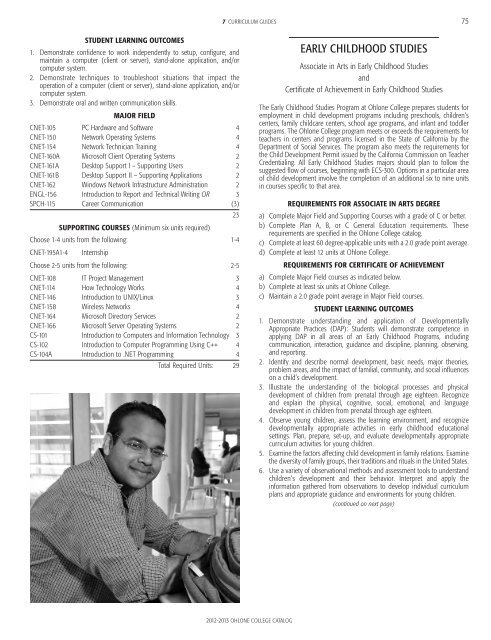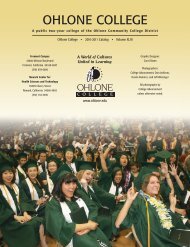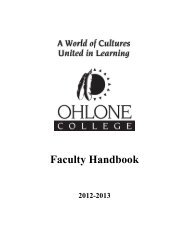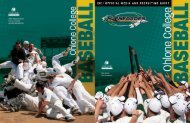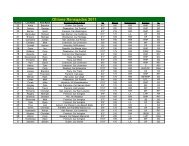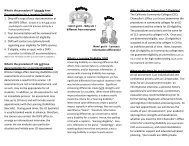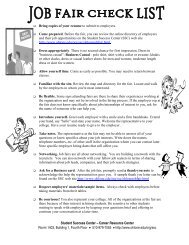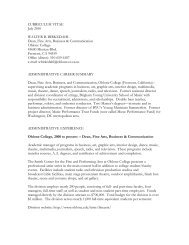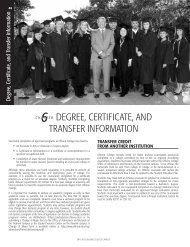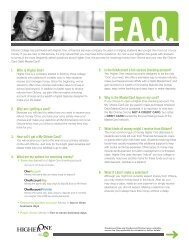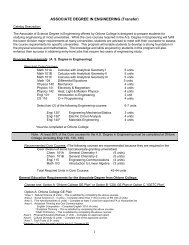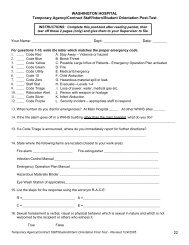2012-2013 Catalog (all pages) - Ohlone College
2012-2013 Catalog (all pages) - Ohlone College
2012-2013 Catalog (all pages) - Ohlone College
Create successful ePaper yourself
Turn your PDF publications into a flip-book with our unique Google optimized e-Paper software.
7 CURRICULUM GUIDES 75<br />
STUDENT LEARNING OUTCOMES<br />
1. Demonstrate confidence to work independently to setup, configure, and<br />
maintain a computer (client or server), stand-alone application, and/or<br />
computer system.<br />
2. Demonstrate techniques to troubleshoot situations that impact the<br />
operation of a computer (client or server), stand-alone application, and/or<br />
computer system.<br />
3. Demonstrate oral and written communication skills.<br />
MAJOR FIELD<br />
CNET-105 PC Hardware and Software 4<br />
CNET-150 Network Operating Systems 4<br />
CNET-154 Network Technician Training 4<br />
CNET-160A Microsoft Client Operating Systems 2<br />
CNET-161A Desktop Support I – Supporting Users 2<br />
CNET-161B Desktop Support II – Supporting Applications 2<br />
CNET-162 Windows Network Infrastructure Administration 2<br />
ENGL-156 Introduction to Report and Technical Writing OR 3<br />
SPCH-115 Career Communication (3)<br />
SUPPORTING COURSES (Minimum six units required)<br />
Choose 1-4 units from the following: 1-4<br />
CNET-195A1-4<br />
Internship<br />
Choose 2-5 units from the following: 2-5<br />
CNET-108 IT Project Management 3<br />
CNET-114 How Technology Works 4<br />
CNET-146 Introduction to UNIX/Linux 3<br />
CNET-158 Wireless Networks 4<br />
CNET-164 Microsoft Directory Services 2<br />
CNET-166 Microsoft Server Operating Systems 2<br />
CS-101 Introduction to Computers and Information Technology 3<br />
CS-102 Introduction to Computer Programming Using C++ 4<br />
CS-104A Introduction to .NET Programming 4<br />
23<br />
Total Required Units: 29<br />
EARLY CHILDHOOD STUDIES<br />
Associate in Arts in Early Childhood Studies<br />
and<br />
Certificate of Achievement in Early Childhood Studies<br />
The Early Childhood Studies Program at <strong>Ohlone</strong> <strong>College</strong> prepares students for<br />
employment in child development programs including preschools, children’s<br />
centers, family childcare centers, school age programs, and infant and toddler<br />
programs. The <strong>Ohlone</strong> <strong>College</strong> program meets or exceeds the requirements for<br />
teachers in centers and programs licensed in the State of California by the<br />
Department of Social Services. The program also meets the requirements for<br />
the Child Development Permit issued by the California Commission on Teacher<br />
Credentialing. All Early Childhood Studies majors should plan to follow the<br />
suggested flow of courses, beginning with ECS-300. Options in a particular area<br />
of child development involve the completion of an additional six to nine units<br />
in courses specific to that area.<br />
REQUIREMENTS FOR ASSOCIATE IN ARTS DEGREE<br />
a) Complete Major Field and Supporting Courses with a grade of C or better.<br />
b) Complete Plan A, B, or C General Education requirements. These<br />
requirements are specified in the <strong>Ohlone</strong> <strong>College</strong> catalog.<br />
c) Complete at least 60 degree-applicable units with a 2.0 grade point average.<br />
d) Complete at least 12 units at <strong>Ohlone</strong> <strong>College</strong>.<br />
REQUIREMENTS FOR CERTIFICATE OF ACHIEVEMENT<br />
a) Complete Major Field courses as indicated below.<br />
b) Complete at least six units at <strong>Ohlone</strong> <strong>College</strong>.<br />
c) Maintain a 2.0 grade point average in Major Field courses.<br />
STUDENT LEARNING OUTCOMES<br />
1. Demonstrate understanding and application of Development<strong>all</strong>y<br />
Appropriate Practices (DAP): Students will demonstrate competence in<br />
applying DAP in <strong>all</strong> areas of an Early Childhood Programs, including<br />
communication, interaction, guidance and discipline, planning, observing,<br />
and reporting.<br />
2. Identify and describe normal development, basic needs, major theories,<br />
problem areas, and the impact of familial, community, and social influences<br />
on a child’s development.<br />
3. Illustrate the understanding of the biological processes and physical<br />
development of children from prenatal through age eighteen. Recognize<br />
and explain the physical, cognitive, social, emotional, and language<br />
development in children from prenatal through age eighteen.<br />
4. Observe young children, assess the learning environment, and recognize<br />
development<strong>all</strong>y appropriate activities in early childhood educational<br />
settings. Plan, prepare, set-up, and evaluate development<strong>all</strong>y appropriate<br />
curriculum activities for young children.<br />
5. Examine the factors affecting child development in family relations. Examine<br />
the diversity of family groups, their traditions and rituals in the United States.<br />
6. Use a variety of observational methods and assessment tools to understand<br />
children’s development and their behavior. Interpret and apply the<br />
information gathered from observations to develop individual curriculum<br />
plans and appropriate guidance and environments for young children.<br />
(continued on next page)<br />
<strong>2012</strong>-<strong>2013</strong> OHLONE COLLEGE CATALOG


